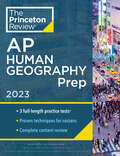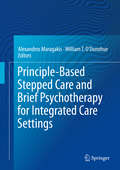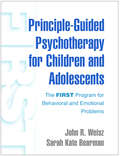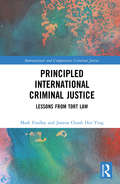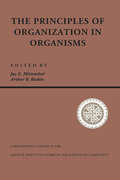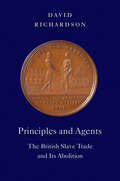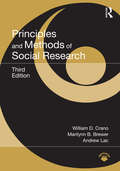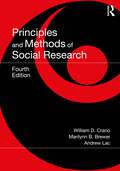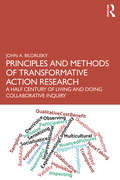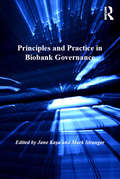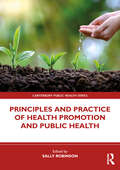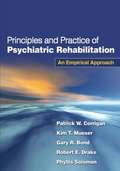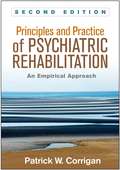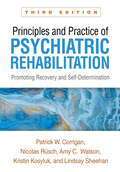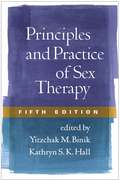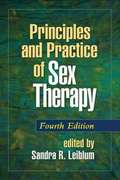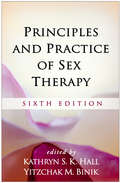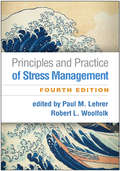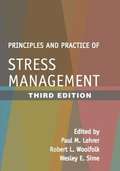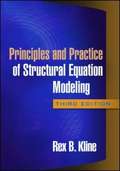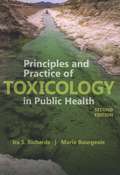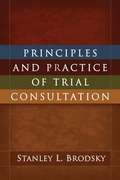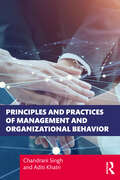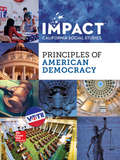- Table View
- List View
Princeton Review AP Human Geography Prep, 2023: 3 Practice Tests + Complete Content Review + Strategies & Techniques (College Test Preparation)
by The Princeton ReviewEVERYTHING YOU NEED TO HELP SCORE A PERFECT 5. Ace the 2023 AP Human Geography Exam with this comprehensive study guide—including 3 full-length practice tests with complete explanations, thorough content reviews, targeted strategies for every question type, and access to online extras. Techniques That Actually Work • Tried-and-true strategies to help you avoid traps and beat the test • Tips for pacing yourself and guessing logically • Essential tactics to help you work smarter, not harder Everything You Need for a High Score • Fully aligned with the latest College Board standards for AP Human Geography • Detailed coverage of all test topics, including population and migration, cultural studies, political geography, urban geography, agriculture, and more • Useful lists of key terms in every content review chapter • Access to study plans, helpful pre-college information, and more via your online Student Tools Practice Your Way to Excellence • 3 full-length practice tests (2 in the book, 1 online) with complete answer explanations • Practice drills at the end of every content review chapter to test your understanding • Helpful maps and detailed charts illustrating trends, theories, and models
Principle-Based Stepped Care and Brief Psychotherapy for Integrated Care Settings
by William T. O'Donohue Alexandros MaragakisThis timely volume provides the practitioner with evidence based treatments for many of the clinical problems encountered in integrated care. It applies the core concepts of stepped care to integrating brief mental health interventions as a way to address ongoing problems in the modern healthcare landscape. It sets out in depth the state of the healthcare crisis in terms of costs, staffing and training issues, integration logistics and management, system culture, and a variety of clinical considerations. Central to the book is a best-practice template for providing behavioral stepped care in medical settings, including screening and assessment, levels of intervention and treatment, referrals, and collaboration with primary care and other specialties. Using this format, contributors detail specific challenges of and science-based interventions for a diverse range of common conditions and issues, including: Depression. Anxiety disorders. Adherence to chronic obstructive pulmonary disorder management. Alcohol and other substance misuse. Attention deficit hyperactivity disorder. Chronic pain. Neurocognitive disorders. Paraphilias: problematic sexual interests.[WU3] Sexual abuse and PTSD in children.A solid roadmap for widescale reform, Principle-Based Stepped Care and Brief Psychotherapy for Integrated Care Settings is deeply informative reading for health psychologists, social workers, psychiatrists, and clinical psychologists. It also clarifies the research agenda for those seeking improvements in healthcare quality and delivery and patient satisfaction.
Principle-Guided Psychotherapy for Children and Adolescents: The FIRST Program for Behavioral and Emotional Problems
by John R. Weisz Sarah Kate BearmanPresenting a fresh approach to child and adolescent therapy, this book identifies five principles at the heart of the most potent evidence-based treatments--and shows how to apply them. Clinicians learn efficient, engaging ways to teach the skills of Feeling Calm, Increasing Motivation, Repairing Thoughts, Solving Problems, and Trying the Opposite (FIRST) to 5- to 15-year-olds and their parents. FIRST principles can be used flexibly and strategically in treatment of problems including anxiety, posttraumatic stress, depression, and misconduct. In a convenient large-size format, the book features 37 reproducible parent handouts, decision trees, and other clinical tools. Purchasers get access to a Web page where they can download and print these materials, plus Spanish-language versions of selected parent handouts.
Principled International Criminal Justice: Lessons from Tort Law (International and Comparative Criminal Justice)
by Mark Findlay Joanna Chuah Hui YingCommencing its search for a principled international criminal justice, this book argues that the Preamble to the Rome Statute requires a very different notion of justice than that which would be expected in domestic jurisdictions. This thinking necessitates theorising what international criminal justice requires in terms of its legitimacy much more than normative invocations, which in their unreality can endanger the satisfaction of two central concerns – the punitive and the harm-minimisation dimensions. The authors suggest that because of the unique nature and form of the four global crimes, pre-existing proof technologies are failing prosecutors and judges, forcing the development of an often unsustainable line of judicial reasoning. The empirical focus of the book is to look at JCE (joint criminal enterprise) and aiding and abetting as case-studies in the distortion of proof tests. The substantial harm focus of ICJ (international criminal justice) invites applying compatible proof technologies from tort (causation, aggregation, and participation). The book concludes by examining recent developments in corporate criminal liability and criminalising associations, radically asserting that even in harmonising/hybridising international criminal law there resides a new and rational vision for the juridical project of international criminal justice.
Principles Of Organization In Organisms
by Jay E. MittenthalBased on a workshop held at the Santa Fe Institute in June, 1990, this book explores structure in organisms—both physical and dynamical—and presents the current status of the search for natural pathways, principles of organization, and the theory of design for organisms. Topics discussed include dynamical systems analysis; the pathways of evolution; development, physiology, and functional morphology; and the principles of dynamical change in connectivity within the networks of processes.
Principles and Agents: The British Slave Trade and Its Abolition (The David Brion Davis Series)
by David RichardsonA new history of the abolition of the British slave trade &“Easily the most scholarly, clear and persuasive analysis yet published of the rise to dominance of the British in the Atlantic slave trade—as well as the implementation of abolition when that dominance was its peak.&”—David Eltis, co-author of Atlas of the Transatlantic Slave Trade Parliament&’s decision in 1807 to outlaw British slaving was a key moment in modern world history. In this magisterial work, historian David Richardson challenges claims that this event was largely due to the actions of particular individuals and emphasizes instead that abolition of the British slave trade relied on the power of ordinary people to change the world. British slaving and opposition to it grew in parallel through the 1760s and then increasingly came into conflict both in the public imagination and in political discourse. Looking at the ideological tensions between Britons&’ sense of themselves as free people and their willingness to enslave Africans abroad, Richardson shows that from the 1770s those simmering tensions became politicized even as British slaving activities reached unprecedented levels, mobilizing public opinion to coerce Parliament to confront and begin to resolve the issue between 1788 and 1807.
Principles and Methods of Social Research
by Andrew Lac William D. Crano Marilynn B. BrewerUsed to train generations of social scientists, this thoroughly updated classic text covers the latest research techniques and designs. Applauded for its comprehensive coverage, the breadth and depth of content is unparalleled. Through a multi-methodology approach, the text guides readers toward the design and conduct of social research from the ground up. Explained with applied examples useful to the social, behavioral, educational, and organizational sciences, the methods described are intended to be relevant to contemporary researchers. The underlying logic and mechanics of experimental, quasi-experimental, and non-experimental research strategies are discussed in detail. Introductory chapters covering topics such as validity and reliability furnish readers with a firm understanding of foundational concepts. Chapters dedicated to sampling, interviewing, questionnaire design, stimulus scaling, observational methods, content analysis, implicit measures, dyadic and group methods, and meta-analysis provide coverage of these essential methodologies. The book is noted for its:-Emphasis on understanding the principles that govern the use of a method to facilitate the researcher's choice of the best technique for a given situation.- Use of the laboratory experiment as a touchstone to describe and evaluate field experiments, correlational designs, quasi experiments, evaluation studies, and survey designs.-Coverage of the ethics of social research including the power a researcher wields and tips on how to use it responsibly. The new edition features:-A new co-author, Andrew Lac, instrumental in fine tuning the book's accessible approach and highlighting the most recent developments at the intersection of design and statistics.-More learning tools including more explanation of the basic concepts, more research examples, tables, and figures, and the addition of bold faced terms, chapter conclusions, discussion questions, and a glossary. -Extensive revision of chapter (3) on measurement reliability theory that examines test theory, latent factors, factor analysis, and item response theory.-Expanded coverage of cutting-edge methodologies including mediation and moderation, reliability and validity, missing data, and more physiological approaches such as neuroimaging and fMRIs. -A new web based resource package that features Power Points and discussion and exam questions for each chapter and for students chapter outlines and summaries, key terms, and suggested readings. Intended as a text for graduate or advanced undergraduate courses in research methods (design) in psychology, communication, sociology, education, public health, and marketing, an introductory undergraduate course on research methods is recommended.
Principles and Methods of Social Research
by Andrew Lac William D. Crano Marilynn B. BrewerThrough a multi-methodology approach, Principles and Methods of Social Research, Fourth Edition covers the latest research techniques and designs and guides readers toward the design and conduct of social research from the ground up. Applauded for its comprehensive coverage, the breadth and depth of content of this new edition is unparalleled. Explained with updated applied examples useful to the social, behavioral, educational, and organizational sciences, the methods described are relevant to contemporary researchers. The underlying logic and mechanics of experimental, quasi-experimental, and non-experimental research strategies are discussed in detail. Introductory chapters cover topics such as validity and reliability furnish readers with a firm understanding of foundational concepts. The book has chapters dedicated to sampling, interviewing, questionnaire design, stimulus scaling, observational methods, content analysis, implicit measures, dyadic and group methods, and meta-analysis to cover these essential methodologies. Notable features include an emphasis on understanding the principles that govern the use of a method to facilitate the researcher’s choice of the best technique for a given situation; use of the laboratory experiment as a touchstone to describe and evaluate field experiments, correlational designs, quasi experiments, evaluation studies, and survey designs; and coverage of the ethics of social research including the power a researcher wields and tips on how to use it responsibly. The new edition features: Increased attention to the distinction between conceptual replication and exact replication and how each contributes to cumulative science. Updated research examples that clarify the operation of various research design operations. More learning tools including more explanation of the basic concepts, more research examples, and more tables and figures, such as additional illustrations to include internet content like social media. Extensive revisions and expansions of all chapters. A fuller discussion of the dangers of unethical treatment to research participants. Principles and Methods of Social Research, Fourth Edition is intended for graduate or advanced undergraduate courses in research methods in psychology, communication, sociology, education, public health, and marketing, and further appeals to researchers in various fields of social research, such as social psychology and communication.
Principles and Methods of Transformative Action Research: A Half Century of Living and Doing Collaborative Inquiry
by John A. BiloruskyPrinciples and Methods of Transformative Action Research delves into both general principles and specific methods for basic steps in the action research process—asking questions, gathering and analyzing data, communicating findings, and pursuing action. The role of collaboration is emphasized, with strategies of value to experts and engaged citizens in doing participatory research and community-based knowledge-building. Detailed attention is given to specific strategies of interviewing, participant observation, and judging and weighing evidence. The book draws on creative and critically minded elements of scientific traditions, such as transparency in telling the "story" of one’s inquiry, identifying data that are "exceptions to the rule," and the value of non-formulaic, improvisational designs. Quite distinctively, the book addresses how to write in one’s own voice, how to integrate action-and-inquiry into one’s everyday life, issues of ethics and social responsibility, and how to consider both immediate, practical needs and "bigger picture," systemic challenges. This book can serve as an undergraduate or graduate social sciences text on research methods. It is also a guidebook for action-oriented research by academics, professionals, and lay people, alike in community agencies, schools, and grassroots organizations, and for socially relevant academic research concerned with social justice, multiculturalism, and inclusiveness.
Principles and Practice in Biobank Governance
by Mark StrangerRapid technological advances, the establishment of large-scale biobanks, and the exchange of data across international boundaries raise a variety of questions for regulators struggling with the problem of how to govern such stores of information and the processes connected with them. Engaging with the pressing issues of privacy, consent, access to data, and benefit sharing, Principles and Practice in Biobank Governance draws together the latest empirical research from the UK, Europe, America, Australia and Asia to focus on these challenges. Current models of governance are critiqued, principles and policies are debated, and new models and theoretical frameworks are presented through this intellectually stimulating, informative volume. This truly international volume offers new insights from a range of disciplinary perspectives and will be essential reading for policy makers and scholars across a range of social sciences, including sociology, bioethics, law and social policy.
Principles and Practice of Health Promotion and Public Health (Canterbury Public Health Series)
by Sally RobinsonPrinciples and Practice of Health Promotion and Public Health brings together the disciplines and fields of study that inform the work of promoting health into one book and provides many examples of practice. It starts with understanding ourselves and our health and continues with chapters on working in health promotion and public health; epidemiology; research methods and evidence-based practice; health psychology; communicating health; health education; health promotion; public health; health protection; arts and health; tackling tobacco, alcohol and drugs; tackling overweight; promoting health in workplaces and promoting health within the National Health Service. Together these communicate the core principles of how to prevent disease and promote health when working with individuals, communities and populations in any country across the world. The book focusses on adults’ health and includes international and UK examples. Principles and Practice of Health Promotion and Public Health complements Priorities for Health Promotion and Public Health, published in 2021. Both are core texts for those studying health promotion or public health and supplementary texts for students of healthcare and social care. They are ideal for public health practitioners and members of the wider public health workforce.
Principles and Practice of Psychiatric Rehabilitation
by Kim Mueser Patrick CorriganThis comprehensive, authoritative text provides a state-of-the-art review of current knowledge and best practices for helping adults with psychiatric disabilities move forward in their recovery process. The authors draw on extensive research and clinical expertise to accessibly describe the "whats," "whys," and "how-tos" of psychiatric rehabilitation. Coverage includes tools and strategies for assessing clients' needs and strengths, integrating medical and psychosocial interventions, and implementing supportive services in such areas as housing, employment, social networks, education, and physical health. Detailed case examples in every chapter illustrate both the real-world challenges of severe mental illness and the nuts and bolts of effective interventions.
Principles and Practice of Psychiatric Rehabilitation, Second Edition: An Empirical Approach
by Patrick W. Corrigan Kim T. MueserThe authoritative text on psychiatric rehabilitation, this book covers everything from conceptual and empirical foundations to exemplary program models. Students and practitioners gain the knowledge needed to help adults with psychiatric disabilities move forward in their recovery process and build personally satisfying lives. The book presents tools and strategies for assessing personal needs and strengths, integrating medical and psychosocial interventions, and implementing supportive services in such areas as housing, employment, education, substance abuse, and physical health. Numerous case examples illustrate both the real-world challenges of serious mental illness and the difference that effective interventions can make. New to This Edition *Incorporates the latest concepts and evidence-based interventions. *Streamlined chapter organization: more concise, yet still comprehensive. *Heightened focus on empowerment, self-determination, and wellness promotion. *New or expanded discussions of the "housing-first" model, harm reduction, peer services and support, and the Affordable Care Act.
Principles and Practice of Psychiatric Rehabilitation: Promoting Recovery and Self-Determination
by Patrick W. Corrigan Nicolas Rüsch Amy C. Watson Kristin Kosyluk Lindsay SheehanThe leading text and go-to practitioner resource on psychiatric rehabilitation is now in a thoroughly revised third edition, bringing readers up to date on current ideas, findings, and evidence-based best practices. The expert authors present the knowledge needed to help adults with psychiatric disabilities develop their strengths and achieve their life goals. The book describes effective ways to assess personal needs and aspirations; integrate medical and psychosocial interventions; implement supportive services in such areas as housing, employment, education, substance use, and physical health; and combat stigma and discrimination. "Personal Examples" throughout the text share the experiences of diverse individuals recovering from serious mental illness. New to This Edition *Increased attention to social determinants of health--for example, the impact of race, ethnicity, gender identity, sexual orientation, poverty, and criminal justice involvement. *Chapter on developing more equitable, culturally competent services. *Expanded coverage of physical health and wellness. *New and expanded discussions of community-based participatory research, peer recovery support providers, and other timely topics.
Principles and Practice of Sex Therapy, Fifth Edition
by Kathryn S. Hall Yitzchak M. BinikThe leading clinical reference and text in the field, originally developed by the late Sandra Leiblum, this volume addresses the full range of sexual problems and concerns that lead men, women, and couples to seek help. Prominent experts describe cutting-edge assessment and treatment approaches that integrate psychological, interpersonal, and medical interventions. Detailed case examples illustrate how the therapeutic strategies are implemented and shed light on the factors that influence outcomes. The book is grounded in current knowledge about sexuality and sexual functioning across the lifespan. Tightly edited, it features an integrative introduction and conclusion plus a brief editorial commentary at the beginning of each chapter. New to This Edition *Reflects major advances in sexual medicine and changes in the DSM-5. *Chapters on infidelity, body image, and noncoercive and coercive paraphilias. *Chapters on sexuality and infertility, disability-affirmative therapy, and sexually transmitted infections. *Expanded lifespan focus: chapters on adolescents/young adults and older adults. *Many new authors and extensively revised chapters.
Principles and Practice of Sex Therapy, Fourth Edition
by Sandra LeiblumThis widely adopted text and clinical reference provides a comprehensive guide to assessment and treatment of all of the major female and male sexual dysfunctions. Leading authorities demonstrate effective ways to integrate psychological, interpersonal, and medical interventions. Every chapter includes detailed clinical examples illustrating the process of therapy and the factors that influence treatment outcomes. New to This Edition Incorporates major advances in research and practice. Chapter topics including persistent genital arousal disorder in women, sexual desire disorders in men, physical therapy for female sexual pain, treatment of sexual abuse survivors, sexuality and culture, and sexual pharmacology. Chapters on sexual difficulties associated with chronic medical illness, as well as sexual interest and desire disorders in both women and men.
Principles and Practice of Sex Therapy, Sixth Edition
by Yitzchak M. Binik Kathryn S. K. HallThis widely used clinical reference and text--now significantly updated with 75% new material reflecting therapeutic advances, diagnostic changes, and increased coverage of sexual minority groups--comprehensively addresses sexual problems and their treatment. Prominent contributors interweave theory, research, and clinical considerations. Detailed case examples illustrate the process of assessment and intervention with individuals and couples across the lifespan, with attention to gender-related, cultural, and health concerns. The volume features an integrative introduction and conclusion, plus an instructive editorial commentary at the beginning of each chapter. New to This Edition *Many new authors and extensively revised chapters. *Coverage of advances in sexual medicine, ICD-11 diagnostic changes, and other timely topics. *Chapters on sexual aversion, female sexual arousal disorder, out-of-control sexual behavior, and BDSM. *Chapters on the transition to parenthood and the treatment of sexual concerns in adult transgender clients. *Chapters on additional medical issues: cancer and spinal cord injury.
Principles and Practice of Stress Management, Fourth Edition
by Paul M. Lehrer, Robert L. WoolfolkThe leading clinical reference and text on stress management has now been significantly revised with 60% new material reflecting key developments in the field. Foremost experts review the "whats," "whys," and "how-tos" of progressive relaxation, biofeedback, meditation, hypnosis, cognitive methods, and other therapies. Chapters describe each method's theoretical foundations, evidence base, procedures, applications, and contraindications. Assessment and implementation are illustrated with extensive case examples. The volume examines the effects of stress on both mind and body, from basic science to practical implications for everyday life and health care. New to This Edition *Greatly expanded evidence base--every method is now supported by controlled clinical research. *Advances in knowledge about stress and the brain are integrated throughout. *Chapter on children and adolescents. *Chapter on selecting the best methods for individual patients. *Chapter on hyperventilation and carbon dioxide biofeedback. *Chapter on neuroinflammation.
Principles and Practice of Stress Management, Third Edition
by Paul Lehrer Robert WoolfolkStructured for optimal use as a clinical reference and text, this comprehensive work reviews effective stress management techniques and their applications for treating psychological problems and enhancing physical health and performance. Leading experts present in-depth descriptions of progressive relaxation, hypnosis, biofeedback, meditation, cognitive methods, and other therapies. Tightly edited chapters examine each method's theoretical and empirical underpinnings and provide step-by-step guidelines for assessment and implementation, illustrated with detailed case examples. The volume also explains basic mechanisms of stress and relaxation and offers research-based guidance for improving treatment outcomes.
Principles and Practice of Structural Equation Modeling (3rd Edition)
by Rex B. KlineFor students and researchers in the social sciences who do not have an extensive quantitative background, Kline (psychology, Concordia U. , Montreal) explains the principles, assumptions, strengths, limitations and applications of structural equation modeling. His presentation therefore is conceptual rather than mathematically oriented, with few formulas and symbols and many examples in a number of disciplines. Among his topics are fundamental concepts, computer tools, identification, hypothesis testing, and mean structures and latent growth models. No dates are noted for previous editions. Annotation ©2010 Book News, Inc. , Portland, OR (booknews. com)
Principles and Practice of Toxicology in Public Health
by Ira S. Richards Marie M. BourgeoisAll public health professionals should have some level of knowledge of the basic principles of Toxicology. Whether dealing with issues as diverse as a workers' compensation claim for a job-related exposure and injury or the removal of toxic wastes from an urban community, public health professionals must be able to communicate with each other, the public, and our political leaders concerning how chemicals can, and the conditions under which they may, realistically produce harm. Principles and Practice of Toxicology in Public Health provides students with an understanding of the nature and scope of the discipline, so that they may be prepared to participate in a meaningful way in the often highly visible problem-solving and decision-making processes required of public health professionals. In four sections, it offers an introduction to the field, as well as the basics of toxicology principles, systemic toxicity, and toxicology practice. The text is immediately readable for the student with little technical background. The Second Edition is a thorough update that has been expaneded with a new chapter on endocrine toxicology.
Principles and Practice of Trial Consultation
by Stanley Brodsky Joel DvoskinA pragmatic guide to a growing area of professional practice, this book describes the multiple roles of the trial consultant and provides tools for carrying them out competently and ethically. Leading authority Stanley Brodsky uses examples from actual trials and depositions to illustrate how knowledge and skills from psychology and related fields are applied in the legal context. He shows how to use scientific methods and findings to assist with jury selection, help attorneys focus their arguments, prepare witnesses for the rigors of cross-examination, and conduct change of venue evaluations. The examples are drawn from a wide range of civil and criminal cases. In addition to behavioral scientists, legal professionals also will find important insights and strategies in this book.
Principles and Practices of Management and Organizational Behavior
by Chandrani Singh Aditi KhatriThis book offers perspectives, insights, techniques, and approaches for efficient and contemporary management practices in an organization. It provides a comprehensive insight into the traditional and contemporary approaches of organizational behavior and their impact on organizational performance in the global era. Ranging from planning to staffing, and controlling to strategic decision-making, the case studies in the book incorporate relevant modern management models and correlate practices of management from organizational perspectives to allow any organization’s direction and environment to be evaluated with suggested recommendations. This textbook consists of two broad parts. The first deals with management trends and functions ranging from the traditional era to the contemporary world. The second part explores the behavioral trends of organizations across domains to analyze the measures taken for improved productivity and sustainability. Drawing theories from psychology, sociology and economics, this book probes into the interrelation between behavior and holistic management by examining the impact of teamwork, motivation, organizational power, and polity, instituting relevant organizational ethics and strategies to create healthy organizational culture. This book will be useful to students, academicians, management researchers, and industry professionals from the field of general management and organizational behavior. It will also be useful for scholars interested in management studies, behavioural studies, business and development, developmental studies, sociopsychology, management, and business strategies.
Principles and Practices of Management and Organizational Behavior
by Chandrani Singh Aditi KhatriThis book offers perspectives, insights, techniques, and approaches for efficient and contemporary management practices in an organization. It provides a comprehensive insight into the traditional and contemporary approaches of organizational behavior and their impact on organizational performance in the global era. Ranging from planning to staffing, and controlling to strategic decision-making, the case studies in the book incorporate relevant modern management models and correlate practices of management from organizational perspectives to allow any organization’s direction and environment to be evaluated with suggested recommendations. This textbook consists of two broad parts. The first deals with management trends and functions ranging from the traditional era to the contemporary world. The second part explores the behavioral trends of organizations across domains to analyze the measures taken for improved productivity and sustainability.Drawing theories from psychology, sociology and economics, this book probes into the interrelation between behavior and holistic management by examining the impact of teamwork, motivation, organizational power, and polity, instituting relevant organizational ethics and strategies to create healthy organizational culture.This book will be useful to students, academicians, management researchers, and industry professionals from the field of general management and organizational behavior. It will also be useful for scholars interested in management studies, behavioural studies, business and development, developmental studies, sociopsychology, management, and business strategies.
